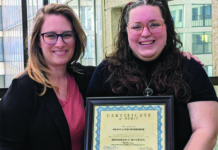Majoring in music is not for the weak-minded. According to Bekah Erkman, a music student, you have to really want this degree. It is a big commitment, and everything is dependent on your own ability and practice.
“Life as a musically-involved student is amazing. The monotonous day to day life of schools gets so much better when you’re musically involved because you get to play music with a huge group of people,” Rebekah Nielson, a marching band student, said.
One of the major challenges music students face is the fact that there are only 24 hours in the day. “The days are long mainly because you have to fit not only the classes you’re required to take, which are only offered at very specific times, but all of your general education classes as well,” Harley Galbasini, a music student, said.

“There’s always a rehearsal going on somewhere. There are many ensembles which meet at different times and when there’s not a rehearsal, the practice rooms are filled with individuals rehearsing their lesson music or working on pieces for later rehearsal,” Galbasini said.
“Music majors live in the practice rooms,” Erkman said. However, there is only so much you can practice stated Erkman. The recommended practice outside of class is two hours per hour in class. “Everything is dependent on your ability to make noise,” Erkman said. Once your voice starts to go, you can only rest or drink tea or lemon water.

Erkman was once told that the vocal k-12 teaching degree really takes about 5 years to complete, but at CMU it is a four year degree. Students are encouraged to take as many credits as possible, but those classes only add up to a few credits. Erkman stated that she is enrolled in eight classes right and that puts her at 12 credits. That isn’t including the external practice lessons.
Erkman also has to plan her academic schedule around education observation hours at local schools. On top of going to class and practicing, music education majors are urged to complete 200 hours of undergraduate observation hours.

Across the board, students involved in music are constantly challenged. For exams, vocal students have to memorize numerous songs, many of which are in foreign languages and various genres, for exams.
“There are plenty of written exams […], but the really important exams are performing. Concerts are normally the exams for ensembles, but for individuals, we have juries,” comprised of faculty, who grade these exams, Galbasini said.
“Being involved in music while also going to college is a lot, but most definitely worth it. It’s extremely time consuming, but because I love the sport and the organization it makes me giving up valuable study time worth it,” Nielson said.
“It can be a very stressful degree but very worth it. Creating music with other people who are just as passionate as you is a wonderful experience and I can’t wait to fulfill my degree and start teaching,” Galbasini said.





